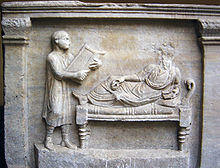An amanuensis (/əˌmænjuˈɛnsɪs/) is a person employed to write or type what another dictates or to copy what has been written by another. An amanuensis may also be a person who signs a document on behalf of another under the latter's authority.[1]

In some academic contexts, an amanuensis can assist an injured or disabled person in taking written examinations. Eric Fenby acted as an amanuensis in assisting the blind and paralysed composer Frederick Delius in writing down the notes that Delius dictated.[2]
History

In ancient Rome, an amanuensis (Latin āmanuēnsis, “secretary”, from ab-, “from” + manus, “hand”[3]) was a slave or freedperson who provided literary and secretarial services such as taking dictation and perhaps assisting in composition. Amanuenses were typically Greek, might be either male or female,[4] and were among the higher-status slaves in ancient Rome who were considered to add value[5] to their masters' lives rather than serving as mere instruments of production.[6] Literary slaves had certain privileges under the law and could be manumitted at a younger age.[7]
Quintilian (1st century AD) cautioned would-be orators about relying on an amanuensis, as the convenience could result in hasty, thoughtless composition—or if the amanuensis was less than competent, have the opposite effect of impeding fluid composition.[8] The Apostle Paul, though literate in Greek, made use of an amanuensis.[9]
Amanuenses played an extensive role in medieval writing and the dissemination of texts. Visionaries in particular relied on amanuenses to translate their experiences into written form.[10] One question in studies of the Christian mystic Margery Kempe, not known to have received a formal education, is the extent to which her amanuenses shaped her self-titled book, completed in 1438.[11] The work of the amanuensis when the author was minimally or not literate likely involved taking dictation, reading back, getting feedback from the author for revision, and possibly shaping the text further during transcription.[12] An amanuensis might bring literary polish to visionary experience, as Adam of Eynsham, for instance, is thought to have drawn on the underworld book of the Aeneid to shape the "rather rambling and confused" visions of his brother Edmund.[13] An amanuensis might act as a translator as well as transcriber. For example, Petrus of Alvastra (aka Peter Olafsson) wrote down the visions of Bridget of Sweden as she recounted them in Swedish, and then translated them into Latin.[14]
Other uses
In Finland, an amanuenssi is an administrative employee of a university, research institution or museum. In Finnish universities, amanuenses can be involved with student guidance counseling, organising course activities, etc.[15]
Job titles
A similar term, Handlanger, exists in German and Dutch (nowadays in both Dutch and German its negative connotation of an unscrupulous, low person acting as criminal assistant prevails whereas the original use of this term for an unskilled and possibly also illiterate person assisting, in the literal sense of lending a hand at construction works has become rather rare).[16]
In French, the term "Écrivain Public" (Public Writer) help people to write personal or professional things according to the client.
Notes
Further reading
External links

 Media related to Amanuensis at Wikimedia Commons
Media related to Amanuensis at Wikimedia Commons
